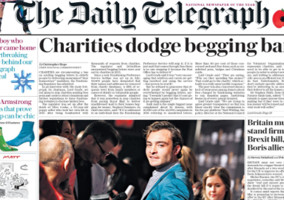Lord Grade has clarified that the Fundraising Regulator is "not looking to stop charities from issuing unaddressed mail" and said a "biro ban" is not in the works, in an article for this website.
In an exlcusive article written by Lord Grade for Civil Society Voices, the chair of the Fundraising Regulator further clarified certain points picked up following his interview with the Daily Telegraph which appeared over the weekend. Grade said the regulator was not looking to stop charities sending unaddressed mail, nor ban any "enclosures" within addressed direct mailings to supporters.
The Fundraising Regulator had already issued a "clarifying statement" issued on Saturday. The regulator said over the weekend it "does not seek to ban ‘enclosures’ in addressed mail, although we recognise that they are an issue for some people and we are speaking to charities about the concerns revealed in our Complaints Report".
It also clarified that "nor do we believe that charities are dodging rules in this respect".
The clarifications come after the Telegraph said on the front page of its 11 November edition, under the headline ‘Charities dodge begging ban’, that Lord Grade, chair of the Fundraising Regulator had “set out plans to stop charities sending free pens and cards to attract donations”.
A spokesman for the Fundraising Regulator said that Lord Grade told the Daily Telegraph that it was “looking at” enclosures within addressed mailings, but said any notion of an outright ban on the practice “is incorrect”.
The spokesman said that the digital article has been amended to say charities “could be asked to review why the send unsolicited free pens, badges and Christmas cards”. Although, one piece on the Telegraph’s website still says that charities “will be asked to review” the practice.
Full statement
The Fundraising Regulator statement in full reads: “The Fundraising Regulator does not seek to ban ‘enclosures’ in addressed mail, although we recognise that they are an issue for some people and we are speaking to charities about the concerns revealed in our Complaints Report; nor do we believe that charities are dodging rules in this respect.
“If a member of the public wants to stop receiving mail from named charities they can register with the Fundraising Preference Service which is available online at public.fundraisingpreference.org.uk or via 0300 3033 517.
“We are grateful to charities for their speedy adoption of the Fundraising Preference Service, which enables individuals to suppress texts, addressed mail, phone call and emails.
“The Royal Mail also has a service which allows someone to opt out of receiving unaddressed mail. The page can be found here.”
Institute of Fundraising criticises ‘misleading headline’ in Telegraph story
The Institute of Fundraising has criticised the Daily Telegraph for its “Charities dodge begging ban” story, saying the headline is “misleading and does not reflect the high standards in the way charities raise vital funds”.
The IoF statement said that the figures seized upon by the Daily Telegraph, and taken from the Fundraising Regulator’s complaints report, show a “very low proportion of complaints compared to contact with the public” from fundraising charities.
It also said that, when issues or concerns were raised by the public, “individual charities respond rapidly and the fundraising community works collectively to address these”.
The IoF’s response can be read in full here.
Karl Wilding, policy director at NCVO, is quoted in the Daily Telegraph defending charities right to send mail to “addresses in a specific area”.
Wilding said this was important, as charities “need to be able to get in touch with people in order to attract new supporters, and writing to addresses in a specific area is an efficient way for them to do that.”
Wilding also tweeted about the coverage over the weekend.
1/ If you don't mind, following exchanges with people in these parts, a conversation with @FundrRegulator staff and an interview with @SkyNews, I’ve got a few more thoughts on today’s #bobbins headlines about charities and fundraising. pic.twitter.com/D12tZpglTz
— Karl Wilding (@karlwilding) November 11, 2017
Related Articles












